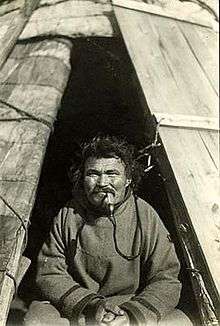Selkup people
The Selkup (Russian: сельку́пы), until the 1930s called Ostyak-Samoyeds (остя́ко-самое́ды), are a Samoyedic ethnic group native to Northern Siberia. They live in the northern parts of Tomsk Oblast, Krasnoyarsk Krai, Yamalo-Nenets Autonomous Okrug, and Nenets Autonomous Okrug.
 Selkup man from Obdorsk, Ob river | |
| Regions with significant populations | |
|---|---|
| 3,649[1] | |
| Languages | |
| Selkup language | |
| Related ethnic groups | |
| Nganasans, Nenets, Enets and Ket people | |
Outline
Selkups speak the Selkup language, which belongs to the Samoyedic languages of the Uralic language family.
The Selkups originated in the middle basin of the Ob River, from interactions between the aboriginal Yeniseian population and Samoyedic peoples that came to the region from the Sayan Mountains during the early part of the first millennium CE.[2]
In the 17th century, some of the Selkups relocated up north to live along the Taz River and Turukhan River. They were engaged mainly in hunting, fishing, and reindeer breeding. In the 18th century, Selkups participated in a massive baptism campaign. However, many returned to their ancient religious beliefs and customs.
According to the 2002 Census, there were 4,249 Selkups in Russia (4,300 in 1970).
There were 62 Selkups in Ukraine, only one of whom is a native speaker of the Selkup language (Ukrainian Census 2001).
References
- Russian Census 2010: Population by ethnicity (in Russian)
- Flegontov, Pavel; Changmai, Piya; Zidkova, Anastassiya; Logacheva, Maria D.; Altınışık, N. Ezgi; Flegontova, Olga; Gelfand, Mikhail S.; Gerasimov, Evgeny S.; Khrameeva, Ekaterina E. (2016-02-11). "Genomic study of the Ket: a Paleo-Eskimo-related ethnic group with significant ancient North Eurasian ancestry". Scientific Reports. 6: 20768. arXiv:1508.03097. Bibcode:2016NatSR...620768F. doi:10.1038/srep20768. PMC 4750364. PMID 26865217.
Further reading
- Sobanski, Florian (March 2001). "The southern Selkups of Tomsk Province before and after 1991". Nationalities Papers. 29 (1): 171–179. doi:10.1080/00905990120036448.
External links
- Article on Selkups from the Red Book of the Peoples of the Russian Empire
- A Selkup fisherman from Western Siberia